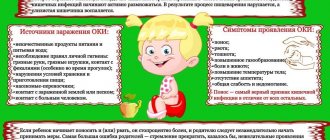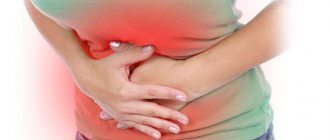Relieving the baby's condition
Methods for providing effective care to a newborn depend on the cause of the abdominal pain.
If there is a problem with the baby’s digestive organs, significant relief comes quickly after defecation. Enzyme or antispasmodic drugs can also help in this case.
If abdominal pain is caused by intestinal colic, it is recommended to remove the following foods from the young mother’s diet:
- fried foods, spicy and fatty;
- coffee;
- sweets;
- fast food;
- sparkling water;
- semi-finished products.
An excellent parent-tested remedy for colic and constipation is dill water, which can be purchased at any nearest pharmacy or prepared independently at home. To do this, you need to pour 1 tablespoon of dill seeds with a glass of boiled water and leave until it cools completely. Strain the infusion and give the child 15-20 ml every 2-2.5 hours.
Other methods to combat colic and constipation in babies:
- Massage the abdomen clockwise to remove accumulated gas.
- Warming the tummy with a warm diaper or heating pad.
- Exercise in the form of pressing the legs to the baby’s stomach.
- Use of a gas outlet tube after training in use from a doctor.
In case of severe constipation, in special cases, the baby can be given an enema, having first asked the doctor about the rules for performing this procedure.
For food allergies, the main direction of treatment will be a change in the children's menu.
In the absence of alarming symptoms such as vomiting and fever, you can try to eliminate the cause of abdominal pain in a newborn on your own.
| Problem | Sign | Cause | How to help the baby |
| Bloating |
| Accumulation of gases formed from milk carbohydrates |
|
| Dysbacteriosis |
|
|
|
| Constipation |
| Eating problems |
|
| Infection or inflammation of the stomach lining |
| Cold |
|
| Dysentery |
| Complication of infection | Calling an ambulance |
| Worms |
| Intestinal parasites |
|
The cause of pain can be appendicitis, which appears before the age of 3 years in rare cases. Its signs include: pain in the abdomen at night, vomiting, diarrhea, fever, the baby’s position is on the side, with legs tucked in, tension in the abdominal muscles on the right side. If these symptoms occur, you should immediately call an ambulance at home.
In the absence of alarming symptoms requiring medical intervention, the baby may simply need help to empty his bowels.
Important! If pain symptoms appear, take the baby in your arms so that he feels your warmth, protection and love.
Medication assistance
Without the recommendation or prescription of medications by a doctor, they cannot be used to treat newborns. But there are a number of drugs that can be used as first aid. They help relieve the condition if the baby has a tummy ache. For vomiting and diarrhea, you can give your child gastrolit and rehydron. These drugs help replenish lost fluid with frequent gag reflex and diarrhea. According to the regimen indicated in the instructions, the drugs are diluted in boiled water and given to the baby to drink after each vomiting and diarrhea symptom. Simple boiled water will also help to avoid dehydration. Drinking for such indications should be frequent and plentiful.
In case of poisoning and increased gas formation, it is allowed to give the baby sorbents that can cleanse the child’s intestines and stomach of harmful substances. Such drugs include smecta, enterosgel. The defoamer espumizan has proven itself well, which doctors recommend giving to babies with severe flatulence.
Antimicrobial and immunomodulatory agents can be used to restore intestinal microflora. These include Enterol, Hilak Forte, Linex (for babies). If it is difficult to determine the cause of a child's pain, you should not feed the child until the doctor arrives, especially if he is vomiting.
With a normal state of digestion, the baby experiences an increase in body weight according to his age and developmental characteristics. It is normal for the baby to rarely burp after eating. The baby's good health and digestion state is indicated by his good mood after feeding, and there is no mucus, blood, foam in the stool, and no pungent odor. Throughout the entire treatment process, doctors recommend that parents not leave the baby alone. Only next to his family will he feel calmer and endure pain more easily.
Interesting topics
- It is believed that dried fruits are very healthy, but can you eat prunes while breastfeeding?
- Breastfeeding is considered a natural contraceptive. But particularly careful mothers want to take birth control pills while breastfeeding. Find out if this can be done?
- If the mother's diet affects the baby's digestion, can the baby experience constipation while breastfeeding?
- During pregnancy, many women suffer from migraines. It happens that this condition also occurs during breastfeeding. Is citramon dangerous when breastfeeding, or can it be safely taken without fear for the baby’s health?
Girls, tell me, have you ever experienced cramps or colic? Leave your comments and write in them, at what age was your baby especially whiny and restless? What diagnosis did the doctor make and what medications did he prescribe?
Source
Causes of colic in a newborn
It is difficult to name one factor that is guaranteed to lead to the appearance of infant colic.
In most cases, colic develops due to a combination of reasons:
- immaturity of the gastrointestinal tract of the newborn. When a baby is born, its stomach is sterile. During feeding, along with mother's milk, he receives beneficial bacteria that form the intestinal microflora. Along with lactobacteria and bifidobacteria, conditionally pathogenic microorganisms also enter the infant’s food tract. With excessively high concentrations of which, the child begins to suffer from colic;
- deficiency of enzymes that digest lactose. The pancreas of a newborn produces a special substance. It can easily break down milk sugar obtained during feeding. If this enzyme is deficient, lactose cannot be processed completely. This leads to increased formation of gases in the intestines and, as a consequence, to prolonged colic;
- improper attachment to the breast. If the baby is breastfed and eats only mother's milk, then during feeding the baby's mouth should cover not only the nipple, but also part of the areola. Correct attachment to the breast prevents air from entering the baby's stomach, reduces the number of regurgitations and the frequency of colic. Mothers of bottle-fed babies need to ensure that the baby does not swallow air from the bottle. To do this, it must be held at an angle of 45°;
- maternal malnutrition. The abundance of caffeine, fiber and fats in the diet can provoke not only food allergies in the baby, but also cause frequent and prolonged colic;
- incorrectly selected infant formula. Sometimes, in order to choose the right nutrition for a formula-fed baby, you will need to change more than one brand of formulas
- physical and psychological factors. In some cases, colic can be caused by things that cause discomfort to the newborn. It could be noise or silence, hunger, a wet diaper, or even his bad mood;
- improperly organized infant feeding regimen. Some mothers, in the old fashioned way, feed their children “by the hour.” Believing that an interval of 2-3 hours allows the baby to remain full. Others give breastfeeding on demand, believing that the baby is crying because he is hungry. Both feeding modes can lead to colic due to hunger or overeating of the baby.
To identify the cause of the pathology, you can try to change the environment - from quiet to noisier, undress the warmly dressed baby, or, conversely, wrap it up. If this does not help, you need to change the feeding regimen.
Causes and associated symptoms
The cause of abdominal pain can have various origins - from functional disorders of the gastrointestinal tract and flaws in the feeding regime to organic pathologies not only of the digestive system, but also of other systems.
Causes of discomfort in the baby:
- colic, bloating;
- errors in the mother's diet;
- air intake during feeding;
- constipation, diarrhea;
- binge eating;
- fast feeding, incorrect posture;
- milk that is too fatty;
- lactase deficiency;
- hernia;
- inflammatory bowel diseases;
- intestinal obstruction;
- disturbances in the functioning of the nervous system.
Let's look at the most common reasons.
Colic
This is the most common cause of intense crying in a child and sleepless nights for parents. Intestinal colic is a functional disorder of the gastrointestinal tract. They appear when the immature digestive tract cannot cope with the digestion of milk. As a result, gas formation increases and a sharp intestinal spasm occurs, accompanied by severe pain.
The baby will notify his parents about colic with a loud, piercing cry, which had not happened before. Until the spasm passes, it is impossible to calm the child. The attack lasts about 30 minutes, most often occurring in the evening, between 18:00 and 24:00.
In addition to loud crying, there are other signs:
- pulling the legs towards the stomach, sudden movements;
- clenching fists;
- anxiety;
- arching of the back, inability to find a comfortable position for sleeping;
- grimaces of pain;
- abdominal muscle tension;
- bloating.
The baby will refuse to eat, even if he is hungry. But you shouldn’t feed a baby with colic. Eating food can trigger a relapse.
How to distinguish colic from a disease requiring medical attention? They are characterized by regularity and temporary nature. They occur daily or several times a day, almost at the same time, the attack lasts from 30 minutes to 2 hours.
Bloating
The accumulation of gases in the intestines is accompanied by painful sensations. Bloating is typical for children aged 1–4 months, the reasons for its appearance are as follows:
- unbalanced diet, consumption of foods that increase gas formation;
- inconsistency between the food given to the child and his age, for example, incorrect selection of formula;
- overfeeding;
- changing formula;
- swallowing air during feeding when screaming, crying, or incorrect posture;
- overexcitation, disruption of the functioning of the nervous system;
- lactase deficiency, allergy to cow's milk protein;
- dysbiosis.
Symptoms of increased gas formation:
- swollen, enlarged, hard belly;
- belching air;
- problems with passing gases;
- pulling the legs towards the stomach;
- crying, worry.
Painful sensations appear a few minutes after feeding.
Constipation
It is one of the three most common causes of abdominal pain in newborns. You can guess that your baby is constipated by the following symptoms:
- no bowel movements for two days in a row;
- hard belly like a watermelon;
- lack of appetite;
- excessive regurgitation after feeding;
- redness of the anus, tension;
- dry, hard stool mixed with blood.
Constipation is more common in babies who are bottle-fed. In order for them to have normal stool, it is necessary to prepare the mixture correctly and not overfeed.
Lactase deficiency
This pathology is characterized by the absence of the lactase enzyme, which is involved in the breakdown of milk sugar - lactose. As a result, it remains undigested in the intestines, and fermentation processes begin.
As a result, the newborn develops the following symptoms:
- pain and rumbling in the stomach;
- excessive regurgitation;
- bloating;
- colic;
- loose, foamy stools that alternate with constipation;
- green stool, appearance of blood, mucus.
The next portion of milk only intensifies the unpleasant symptoms.
Dysentery
This is an acute bacterial intestinal disease. Bacteria enter the baby's body through dirty hands, toys, dishes, and various objects.
Symptoms of the disease:
- abdominal pain;
- crying, anxiety;
- drowsiness;
- increased body temperature;
- loose stools with a specific odor, with blood, mucus, pus;
- vomit.
With dysentery, signs of intoxication of the body come to the fore, so it is impossible to confuse the disease with overfeeding or colic.
Intestinal obstruction
The pathology is characterized by impaired evacuation of intestinal contents. The cause may be congenital developmental anomalies or spasms. The baby needs the help of a surgeon, otherwise peritonitis and death are likely to develop.
Symptoms of intestinal obstruction in infants:
- cramping severe pain;
- bloating;
- vomiting mixed with bile;
- scanty stool or no stool.
The pain is so severe that the baby cannot even scream, but spins like a top.
Stomach pain in a newborn - signs, causes, what to do: treatment
The newborn's intestines begin their work while still in the womb, but at the time of birth they are not yet ready to digest food. Many parents are faced with the fact that in the first months, the baby is often bothered by his tummy. This happens because food cannot be fully digested.
If suddenly a newborn has a tummy ache, it is necessary to take all measures to improve his well-being. Of course, it is better to consult a pediatrician, but if this is not possible, you can try to eliminate the symptoms of pain yourself.
Massage
In order to improve intestinal motility, it is necessary to massage the abdomen in a clockwise direction. As a result of this, the gas bubble will move to the rectum, and subsequently exit out.
Physiotherapy
Place the baby on his back and gently bend his legs at the knees, bringing him to his tummy. Try to do this exercise often, especially if your baby has flatulence.
Dill water
Take one spoon of dill and pour a glass of boiling water over it, let it brew for two hours. After this, strain and feed your baby three times a day, before meals. Dill has a good carminative and antispasmodic effect. Dill can be replaced with a preparation such as Plantex. Its effect is exactly the same as that of dill, but giving it to a child is much easier.
What else can you do if your baby is experiencing abdominal pain:
Medications
Espumisan or Sab simplex have a good carminative effect. They do not cause allergies, which means they are safe. Espumisan is not absorbed into the blood; its effect is exclusively local, in the intestines. You can buy this medicine in the form of drops at the pharmacy, but first consult a specialist about the dosage. You need to take the drug until the symptoms of the disease disappear. Infants are given medicine immediately after feeding in order to prevent pain in advance.
When bloated. A special gas outlet tube can be inserted into the baby's anus; it is first sterilized and lubricated with Vaseline. The first time such a procedure should be carried out by a pediatrician, and the mother can simply observe and learn.
For spasmodic pain. Apply something warm to your stomach, such as a heating pad or diaper.
Despite the fact that there are special medications for infants, it is still not recommended to give them without a doctor’s prescription. After all, you are unlikely to be able to make a diagnosis yourself.
But, nevertheless, there are some drugs that help improve digestion:
• diarrhea and vomiting. When vomiting and diarrhea occur, the body is deprived of fluid, which means the danger of intoxication increases. You can replenish the water balance and saturate the body with useful substances with the help of drugs such as: Regidron and Gastrolit. They must first be dissolved in water, and then the baby must be given food according to the instructions;
• gas formation and bloating during poisoning. In this case, enterosorbents will help - medications that absorb all harmful substances from the stomach and intestines. For example, Smecta or Enterosgel;
• intestinal infection and diarrhea. To restore the intestinal microflora, it is necessary to give antimicrobial and immunomodulatory drugs. These include Linex, Hilak Forte.
If your baby has a tummy ache and you don't know what to do before the baby arrives, do not try to feed the baby first, as in most cases this can make the situation even worse. This is especially true in cases where the child often vomits.
Important! If vomiting and diarrhea do not stop throughout the day, call an ambulance as soon as possible!
Your baby’s digestion is definitely fine if:
• he is gaining weight according to his age;
• after the baby has eaten, he practically does not spit up, but a small amount of milk still comes out;
• after the baby has eaten, he is in a very good mood, he is cheerful, and his tummy is soft;
• there is no mucus or foam in the stool, it is homogeneous, without the presence of an unpleasant and pungent odor.
In most cases, which are incomprehensible to you in their manifestation, only a pediatrician can determine what happened and what measures to take. Be sure to call an ambulance if the pain lasts more than one hour, the baby’s body temperature rises, he vomits, and the stool is of an unclear color.
Much will depend on how correctly you behave. The main thing is to remain calm and constantly be near the baby, because the presence of the mother nearby will make it much easier for the baby.
Useful links:
How to tell if your child has a stomach ache
Babies express their feelings and needs by crying. The cause of crying can be fear, boredom, discomfort from wet diapers, hunger, changes in ambient temperature and pain. The source of anxiety can be determined by the intensity of the crying, its intonation and the baby’s characteristic behavior. So, in case of pain, the baby’s cry is sharp and piercing, and does not stop after the child is picked up. The child may refuse food and not respond to soothing words or lulling.
Pain syndrome in infants occurs most often with otitis media, intracranial pressure, infectious diseases accompanied by inflammatory processes, as well as various pathologies of the digestive system. Therefore, only a doctor can determine what exactly is hurting a baby.
If the baby has a normal temperature, there are no signs of intoxication of the body and visible inflammatory reactions, and sharp crying is replaced by periods of calm, when the baby walks, sleeps normally, eats with appetite and gains weight, infant colic is diagnosed. Colic is an attack of intense pain caused by increased gas formation and stretching of the intestinal walls, resulting in spasm.
The main symptoms of colic are:
- Sharp crying that appears suddenly, often in a dream, or after the child has eaten. A baby can scream incessantly from several minutes to several hours, most often in the evening and at night. The crying stops as suddenly as it started, rather than subsiding gradually, while the baby may immediately begin to smile or fall asleep. After some time, everything repeats again.
- With pain caused by colic, the baby may turn pale or, conversely, blush. Muscle tone is increased, the stomach is tense.
- The child pulls his legs towards his tummy or twists them.
- After the gases pass, the child feels better.
Unfortunately, not only gases can bother a baby; some pathological conditions of the digestive system, accompanied by pain in the abdomen, are potentially dangerous to the health and life of the baby. Parents should know how certain diseases manifest themselves in order to promptly seek medical help.
Treatment prognosis and possible complications. Consequences
Infant colic is not a disease - it is a physiological process of development of the digestive system that does not require special treatment. Taking medications only briefly relieves the symptoms of pain, without eliminating the root cause of their occurrence. Pediatricians note that there is no universal remedy for getting rid of colic; some babies are helped by massage and a warm bath, others only by medications, and others are distracted from pain and calm down at the first sounds of the rhythmic hum of household appliances.
When an infant exhibits abdominal pain, it is important to exclude other causes of its occurrence, since an incorrect diagnosis can lead to complications. Thus, warming the tummy with a heating pad is contraindicated in case of inflammatory processes in the body, and taking medications based on simethicone can harm the baby with intestinal obstruction. Therefore, at the first signs of abdominal pain, parents should not prescribe treatment on their own, but be sure to show the child to a pediatrician.
Colic in a newborn - symptoms
Baby crying accompanies any discomfort that the baby experiences. The baby simply cannot tell his parents in a different way about what is bothering him. But colic and gas in newborns can be recognized by characteristic signs.
Anxiety. The baby cannot lie quietly in the crib and shows signs of anxiety even in his arms. For healthy babies who feel well and enjoy contact with their parents, this behavior is not typical.
A shrill cry. The baby cries loudly and loudly, and looking at him, the mother understands that the baby is in pain. The crying is not monotonous, it is interrupted, then becomes louder and can last up to several hours.
Pulling the legs towards the stomach. This is one of the main signs that allows you to understand that a newborn has colic. The child experiences pain in the intestinal area and instinctively tries to tighten his legs to reduce pain. This is easy to notice when the baby is lying in the crib. The same thing happens in the arms of parents.
Release of gases. The baby seems to be straining his tummy, and gas can be heard coming out from time to time. This helps the baby and reduces the pain of a colic attack, but after a while the pain may occur again.
Pale skin. During an attack of colic and painful intestinal spasms, the baby's face and arms may look paler than usual.
Changing the type of stool. With severe digestive disorders, which are always accompanied by intestinal colic, the child’s stool may acquire a greenish tint. Lumps of mucus may appear in it, and the frequency of the urge to go big increases.
All symptoms or only some of them may be observed at the same time. With severe attacks of colic, the baby experiences serious discomfort, so it cries, raises its legs, looks pale, and its tummy feels tight and tense to the touch.
What not to do?
In conclusion? I would like to warn you about what not to do in a situation where a newborn’s tummy is churning.
First of all, you should not rush to conduct a medical examination and switch to artificial feeding of the baby! The idea that milk formulas enriched with all kinds of probiotics can relieve tummy problems is just a myth. They will never replace mother's milk in their properties.
Also, there is no need to look for tummy tummy medications for newborns. In most cases, information about their effectiveness is nothing more than a publicity stunt, and they do not bring relief to the child. In addition, they have contraindications and side effects, and their frequent use inhibits the natural formation of the digestive system and the formation of beneficial intestinal microflora.
You must remember that there is no better therapy than mother's care and love for a newborn baby. Your milk and attentive attitude towards your baby is enough to ensure that the child does not get sick.
Pediatricians hear complaints that a newborn's stomach hurts quite often. Almost half of parents and their children experience this disease. Discomfort and painful spasms that disrupt the sleep of the entire family are sometimes observed almost every night until the baby is 2-4 months old.
In such a situation, the main thing is to remain calm. Remember that this won't go on forever. It is important to realize that your baby is in pain and scared, he is also tired of the exhausting pain and wants to sleep. Try to be patient and help your baby get through this difficult period in his life.
How to get rid of colic in a newborn
Proper care helps reduce the risk of infant colic. These methods will help breastfed and bottle-fed babies.
Place the baby on your tummy. Do this before each feeding and leave for 10 minutes. This simple exercise improves intestinal motility and strengthens the anterior abdominal wall.
Hold in your arms after eating. Do not rush to put your baby in the crib after feeding, even if he has fallen asleep. Hold it vertically, gently press it to yourself, and place the head on your shoulder. Walk around the room for a few minutes with the baby in your arms. During this time, the excess air that the baby swallowed during feeding will be released, and gases will not accumulate in the intestines.
Do gymnastics. During the day, stroke the baby, do a light massage of the back and tummy, and perform acupressure around the navel. Stroking massage movements relax the digestive system, eliminate colic, and are very pleasant for the baby and mother.
Cause of tummy pain in an infant
Why does my baby have a tummy ache? There are several reasons, one of which is intestinal colic and gas, and what can cause colic and gas?
Firstly , mother's nutrition. Gases in the intestines of a baby are formed in the same way as in an adult. Some foods cause severe gas formation, while others produce virtually no gas formation. Remember what food made you fart before, before pregnancy. Eliminate this food immediately. Next, carefully monitor which foods your baby starts to get a tummy ache after. To do this, separate your meals for several days, eat soup separately, and after a while porridge or meat separately, in order to understand exactly which product is not suitable for both of you now.
What can a nursing mother eat - list of allowed foods
It may turn out that the set of dishes remaining after all the exceptions is not rich. Don't be upset, this is a temporary measure. In a few months, your baby will grow up, become larger, and gases will easily leave his body.
The second reason that a baby’s tummy hurts is the mental state of the nursing woman. It is very important not to be nervous. The mother’s experiences are transmitted to the child; with nervous excitement, his muscles tense, compress and make it difficult for gases to exit the anus.
The third possible cause of abdominal pain in infants is increased fat content of milk. At the same time, thick, fatty milk is poorly absorbed in the baby’s digestive system and causes pain. In such cases, it is enough for the mother to give the baby some water before feeding.
What to do when your baby has a tummy ache?
- When a baby has a tummy ache, you sometimes need to use a small flexible tube to drain gas into the baby’s butt. - Gas injections in a baby - how to help?
- Lightly heating the tummy also helps, for example, with a warm diaper (it is pre-ironed with an iron) or with a warm mother’s belly (the mother takes the baby in her arms and presses her tummy to her). — Help for infants with colic
- To prevent the appearance of intestinal colic, the baby is given a tummy massage (light stroking around the navel in a clockwise direction) and gymnastics (bending and straightening the legs towards the tummy). It is also necessary to place the baby on his tummy before feeding.
An excellent remedy for tummy pain is a weak decoction of chamomile.
The amount of chamomile is taken at the rate of one tablespoon per liter of water. For a day, it is enough for the baby to brew one glass (200 g of water and 1/5 of a teaspoon of chamomile). The broth should be strained, poured into a bottle and given to the baby to drink before feeding. A hungry baby will first mistake this water for food and will actively suck it out. After about fifteen minutes, the chamomile decoction will pass from the stomach to the intestines, the child will feel hungry again and will let you know about it. Now feed him milk.
From ready-made pharmaceutical products, medications based on simethicone (for example, Bobotik) are used to relieve and prevent intestinal colic.
On this topic:
- Gas tube for newborns
The first months of a baby's life, especially if it is the first-born, can be a real test for a young mother. Communication with and care for a child raises many questions. Finally, the first days and weeks are over, the baby and mother begin to understand each other, and suddenly, the very recently established rhythm and way of life of the family begins to be disrupted again. Outwardly, a completely healthy baby begins to be capricious, cries, and nothing can calm him down. The cause of concern may be that the baby has a tummy ache.
Causes of colic in infants
Colic in infants appears in the third week of life and stops when the baby is three months old. The main reason for their occurrence is called functional immaturity of the digestive system, which leads to increased gas formation in the intestines.
There are a number of factors that contribute to the appearance of infant colic, as well as influencing their intensity and duration:
- Swallowing air during feeding. Incorrect attachment to the breast or incorrectly selected nipples on formula bottles (too large or small hole) contribute to the swallowing of air, which bursts the walls of the stomach and intestines.
- Enzyme deficiency in newborns. To digest food, the baby needs enzymes; if the baby was born ahead of schedule, their production in the stomach has not yet been established. This can lead to indigestion, which results in frequent regurgitation of curdled milk. Incompletely digested food causes fermentation processes in the intestines and leads to increased flatulence. As you get older, the problem goes away on its own. In addition to the factor of gastrointestinal immaturity, overfeeding leads to digestive disorders.
- Changes in intestinal microflora. At birth, the child’s intestines are sterile, the colonization of its microflora occurs gradually, and its composition can constantly change. Any changes may be accompanied by constipation or diarrhea. Doctors do not diagnose dysbacteriosis until one year, since the quantitative and qualitative composition of the microflora is at the stage of formation.
- Non-compliance with diet by a nursing mother. The composition of breast milk varies depending on the foods a woman consumes. For this reason, foods that cause flatulence, constipation, and food allergies should be excluded from the menu. And also, you should not get carried away with increasing the fat content of milk, as this can lead to digestive upset in the baby.
- Incorrect feeding regimen. Pediatricians recommend feeding babies as needed. When a child is hungry, the stomach secretes a sufficient amount of juices and enzymes necessary for digestion. When feeding on time, the digestive system may not be ready, which causes heaviness and pain in the abdomen, and puts additional stress on the pancreas.
- Violation of the temperature regime in the room. The microclimate in the room where the baby is located affects the digestion processes. If the child is hot and the air in the room is dry, the baby refuses food, feels thirsty, and may experience constipation and colic. When you feel cold, a large amount of energy is spent on thermoregulation, while intestinal function slows down, and cramps may occur.
- Weak abdominal muscles. The condition of the abdominal muscles affects intestinal motility - with hypertonicity and severe crying, overexertion of the abdominal muscles can cause vomiting. Weak muscles with hypotonicity, on the contrary, lead to a slowdown in intestinal motor function, which is accompanied by constipation.
- Unstable emotional situation in the family. Even after birth, the baby and mother are one, physically and emotionally. So, a mother can anticipate the baby’s awakening; she releases breast milk a few minutes before the baby’s hungry cry. Children, in turn, also adopt the mother’s mood and emotional state, show anxiety during her long absence and fall asleep better in the same room with the parent. Therefore, it is not surprising that stress, postpartum depression and quarrels in the family can affect the behavior of a baby, cause anxiety in him, and with it colic of psychosomatic origin.
Improper feeding is one of the most important factors in the occurrence of colic. Inappropriate or thick formula, a large hole in the nipple, incorrect tilt, large portions - all this leads to increased gas formation and abdominal pain
Prevention
It is impossible to prevent the occurrence of infant colic; this is the path that all parents and children must go through, however, by eliminating the factors that contribute to its occurrence, the frequency and intensity of the pain syndrome can be significantly reduced.
Methods for preventing colic in infants are:
- Daily regime. In order to normalize digestive processes, you should not put your baby to bed immediately after feeding. After the child wakes up, it is necessary to maintain a wakefulness regime, the duration of which depends on the age of the baby. It is better to do active communication or gymnastics in the first half of the day, and in the late afternoon schedule a relaxing massage and bathing so as not to overstimulate the baby’s nervous system.
- You should not overfeed the baby, since the amount of food for which there are not enough enzymes undergoes a process of rotting in the intestines, which leads to increased gas formation.
- Correct attachment to the breast, preventing air from being swallowed and injury to the nipple. If cracks in the nipples have already formed, silicone pads should be used until they heal, since the fear and pain that the mother experiences during feeding are transmitted to the baby and can trigger an attack of colic.
- It is necessary to dress the child in loose clothing made from natural fabrics. Swaddling, an incorrectly worn diaper, or tight-fitting onesies can create pressure on the intestines, which can affect bowel function. When choosing clothes, you should exclude outfits made from synthetic fabrics that disrupt thermoregulation and cause overheating of the baby.
- Carrying your baby upright after each feeding allows air to escape as a burp.
- Strengthening the abdominal muscles with the help of gymnastics, massage and regular laying on the stomach improves peristalsis, prevents constipation and flatulence.
Waiting for the doctor
The first thing to do is to refrain from giving your child painkillers! Until a doctor makes an accurate diagnosis, such self-medication can cause irreparable harm! To really ease your baby's pain, first of all, comfort him, caress him and surround him with attention. If the malaise is accompanied by frequent bowel movements, in which a lot of salts and liquids leave the body, provide the child with plenty of fluids.
However, this does not mean that you should force the patient to drink glasses of water. It is better to offer drinking one tablespoon at an interval of 10 minutes
If the malaise is accompanied by frequent bowel movements, in which a lot of salts and liquids leave the body, provide the child with plenty of fluids. However, this does not mean that you should force the patient to drink glasses of water. It is better to offer drinking a tablespoon at an interval of 10 minutes.
How to help your child at home
If you experience abdominal pain, you should immediately contact a specialist, call emergency help, or go to the hospital yourself. You should not take risks and self-medicate, even if grandparents and neighbors say that all children have a tummy ache, so you need to give medicine or give a massage. In the first month of a baby’s life, you should not listen to anyone’s advice - only a good pediatrician will determine what hurts, tell you if there are any pathologies and what to do next.
First aid
When doctors arrive, a mother whose one-month-old baby has a tummy ache needs to try to calm the baby down:
- take him in your arms, hold him vertically so that his head rests on his shoulder;
- do a light, simple massage, gently stroking the area around the navel clockwise;
- allow him to “work” with his legs by laying him on his back and straightening and bending his legs so that his knees touch his stomach;
- Give me some water to drink.
These methods will alleviate the condition or help normalize peristalsis, if the problem is physiological. You should not refuse medical help - pediatricians will recommend medications, exercises, nutrition, and will tell you what to do if your newborn is in pain.
Drug treatment
In the absence of pathologies, doctors recommend using special medications to eliminate colic that normalize the functioning of the digestive system. Espumisan, Simikol, Kolikid, Semiticon safely eliminate gas bubbles, break them down, and remove the cause of bloating and colic. There are safe preparations based on herbs: Plantex, Bebinos, Dill water, which have proven themselves well.
Traditional methods
For centuries, traditional medicine has accumulated recipes to help babies and their parents at home.
Still working flawlessly:
- dill – 12 tsp. seeds, pour a liter of boiling water, let it brew for 30 minutes, strain through several layers of sterile bandage or gauze, let drink 10 minutes before. before meals 2-3 times a day;
- fennel – 1 tsp. seeds, pour a liter of boiling water, leave for 30 minutes, strain, give 1 tsp before meals;
- chamomile - a decoction of flowers is prepared in different ways, but most often this drink is recommended for children. Brew 2-3 tbsp. boiling water 1 tsp. dry collection, keep on low heat for 5 minutes. Leave for 30 minutes, strain, drink 1-2 tsp. before feeding or diluted with boiled water to quench thirst. Chamomile is good both as an anti-inflammatory agent and as a general strengthening, tonic, helping to improve intestinal function.
A mother can help her baby by remaining calm, affectionate, and solving emerging problems without panic. A woman needs to take care not only of the child, but also of herself, follow the necessary diet, rest and spend more time in the fresh air, avoid stress in order to receive a sufficient amount of vitamins and nutrients that the child will also receive with milk.
Is it possible to help the baby by refusing to eat?
Thus, we almost figured out why newborns have a tummy ache, but we missed one of the questions that interests the vast majority of nursing mothers - diet. Recent studies by pediatricians from around the world prove that there is virtually no relationship between what a woman eats and the formation of gas in her child. In many Western countries, mothers are allowed to eat whatever they are used to. That is, they do not need to limit themselves to healthy foods - meat, fresh vegetables and fruits, dairy products and even sweets. The only foods that are forbidden are those that cause allergic reactions and various harmful foods that are undesirable for everyone without exception:
- alcohol;
- carbonated drinks with sugar;
- energy;
- fast food;
- fried, fatty and overly spicy foods.
Of course, you can experiment with your diet. After all, a short-term refusal of whole milk or legumes has never killed anyone, but, unfortunately, even after eliminating from the diet all foods that could theoretically cause bloating, mothers see their newborn babies have a tummy ache. What to do if the diet does not help, but there are no other obvious symptoms of the disease (constipation, diarrhea, etc.)?











